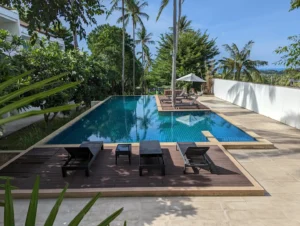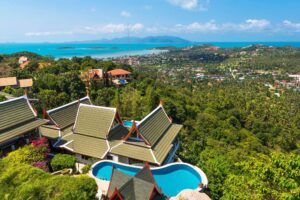Koh Samui’s shores beckon not only tourists but also expats and investors, pulling them in with its laid-back tropical lifestyle, dynamic expat community, and ever-evolving infrastructure. From sandy beaches to vibrant nightlife, Koh Samui offers a blend of leisure and liveliness, making it a hot spot for those looking to put down roots or simply enjoy a flexible, short-term stay.
The island’s property market is as diverse as its beaches, catering to both buyers and renters. But which option truly benefits the would-be resident or investor? Let’s take a closer look at the pros and cons of renting versus buying property on this island paradise and help you decide which path aligns best with your vision.
Renting Property in Koh Samui
Advantages of Renting
- Flexibility – Renting offers a level of flexibility that’s hard to beat. Digital nomads and transient travellers flock to rentals because they can pack up and go without long-term ties. For those not sure if they’ll stay, renting provides the freedom to move on a whim, whether it’s to another neighbourhood or even another country. Plus, long-term rentals offer plenty of variety.
- Lower Upfront Costs – Let’s be real—buying property means a significant upfront investment. Renting, however, requires just a deposit and monthly rent, often making it a lighter lift for those looking to settle temporarily without draining their finances.
- Maintenance and Upkeep – With renting, the burden of big-ticket repairs typically falls to the landlord. That leaky roof or broken AC? It’s not your wallet taking the hit. This can be a lifesaver in tropical settings like Koh Samui, where salty air and humidity can do a number on a property.
- Testing the Waters – Renting lets you live in multiple areas before choosing one to settle in. Want to experience the best areas for a long-term stay? Test out different spots until you find a neighbourhood that resonates with your lifestyle, whether it’s lively Chaweng or tranquil Bophut.
Drawbacks of Renting
- No Investment Growth – Property appreciation? Not in a rental. Renters miss out on the potential value increase that homeowners enjoy. Renting can feel like pouring money into someone else’s investment without reaping the rewards.
- Rent Fluctuations – With tourism as a significant income stream, Koh Samui’s rental market can fluctuate. High-demand seasons may bring sudden rent hikes, especially in premium locations close to beaches.
- Limited Personalization – Renters often can’t fully customize their spaces. While a few decor tweaks are allowed, major changes are usually off the table, meaning you might need to compromise on your vision of a dream island home.
- Dependence on the Landlord – Your rental’s upkeep and even renewal depend on the landlord’s decisions. This reliance can sometimes lead to uncertainty, especially if your landlord decides to sell or suddenly increase rent.
Ideal Scenarios for Renting
Renting is a solid choice for:
- Digital nomads who thrive on flexibility.
- Retirees who prioritize ease without a commitment to property ownership.
- Investors who prefer to keep their capital free for diverse opportunities.
Buying Property in Koh Samui
Advantages of Buying
- Asset Building – Buying property isn’t just securing a place to stay—it’s an investment. With Koh Samui’s real estate value steadily climbing, owners can potentially enjoy capital appreciation in prime locations. Imagine owning a property in Bophut; it’s like planting a stake in paradise.
- Complete Personalization – Owners get creative control. Paint the walls, add a pool, or revamp the interior—your property, your rules. This level of freedom is a major perk for those looking to create a personalized sanctuary.
- Rental Income Potential – Koh Samui’s tourist influx provides rental opportunities for property owners. Many owners turn their homes into vacation rentals, capitalizing on the demand for unique stays. Long-term rentals for other expats are another lucrative option, helping offset property maintenance costs.
- Stability – Buying a home offers stability that renting can’t match. Homeowners don’t worry about rent hikes or lease renewals. It’s your property, so you dictate the terms.
Challenges and Costs of Buying
- Higher Upfront and Ongoing Costs – Buying involves a hefty initial investment—down payments, legal fees, and, for foreigners, navigating Thailand’s ownership rules. Beyond that, upkeep is entirely on the owner’s shoulders.
- Foreign Ownership Restrictions – Foreigners face limitations on land ownership in Thailand, with condos being one of the few options available under Thai law. Setting up a Thai Limited Company or securing long-term leases are alternative paths, but both come with their complexities.
- Market Risks – Property value doesn’t always appreciate, and unforeseen market conditions can impact resale. The Thai market has its unique rhythms, so a potential buyer should keep a keen eye on local real estate trends.
Ideal Scenarios for Buying
Buying suits:
- Long-term residents aiming for a lasting investment.
- Investors eager for rental income opportunities.
- Families or retirees seeking a stable, permanent base in Thailand.
Financial Comparison of Renting vs. Buying
| Expense | Renting | Buying |
|---|---|---|
| Initial Cost | Deposit, first month’s rent | Down payment, legal fees, taxes |
| Ongoing Monthly Cost | Rent | Mortgage (if financed), maintenance |
| Maintenance | Landlord’s responsibility | Owner’s responsibility |
| Investment Growth Potential | None | Possible property appreciation |
Potential for Return on Investment
Buying can yield returns, but the numbers vary. For instance, a property bought in Chaweng or Lamai may see a 5-10% appreciation in a good year, whereas renting only results in sunk costs. The opportunity cost, however, includes the liquidity that renting preserves, allowing renters to invest elsewhere.
Legal Considerations for Foreigners
Buying – Thai law restricts foreigners from owning land outright, though condos allow up to 49% foreign ownership. Alternatives include setting up a Thai Limited Company, which requires a Thai partner, or securing a 30-year lease.
Renting – Renters benefit from straightforward lease agreements, often running six months to a year. Security deposits are standard, and tenant rights are generally well-respected on the island.
Lifestyle Factors to Consider
Location – Koh Samui’s neighbourhoods each have their charm. Chaweng, lively with nightlife and beach vibes, contrasts with Bophut, known for its serene ambience. Renting first allows exploration of these areas before committing to one.
Community and Expat Network – Koh Samui’s expat scene thrives, with a supportive community in areas like Lamai and Maenam. For those keen on connecting with like-minded people, these neighbourhoods offer community events, international dining spots, and more.
Long-Term Commitment – Buying ties you to the island for the foreseeable future. Renting, on the other hand, grants freedom. The choice boils down to personal priorities—stability or flexibility.
Future Development – Ongoing projects can be a boon for property values, particularly near upcoming resort areas. Property owners stand to benefit from these changes, while renters have the option to move if new developments disrupt their preferred locale.
Tax Implications and Financial Considerations
For Buyers – Thailand imposes property taxes and annual taxes. Additionally, capital gains taxes may apply upon resale.
For Renters – Renters generally face no tax obligations unless they’re earning rental income or holding certain visas.
Financing Options – Foreigners can secure mortgages from certain banks, albeit with stricter conditions and lower loan-to-value ratios. Interest rates are also higher for non-residents, which can significantly impact the long-term costs of buying.
Conclusion: Weighing Your Decision
Buying provides stability, potential investment returns, and creative freedom, but comes with risks and commitments. Renting, meanwhile, is easier on upfront costs and offers flexibility, ideal for those who want the freedom to explore Koh Samui without long-term ties. Whether you’re a digital nomad or a retiree, Koh Samui has an option that aligns with your lifestyle and financial plans.
So, are you ready to commit to an island oasis, or do you prefer the freedom to roam?



